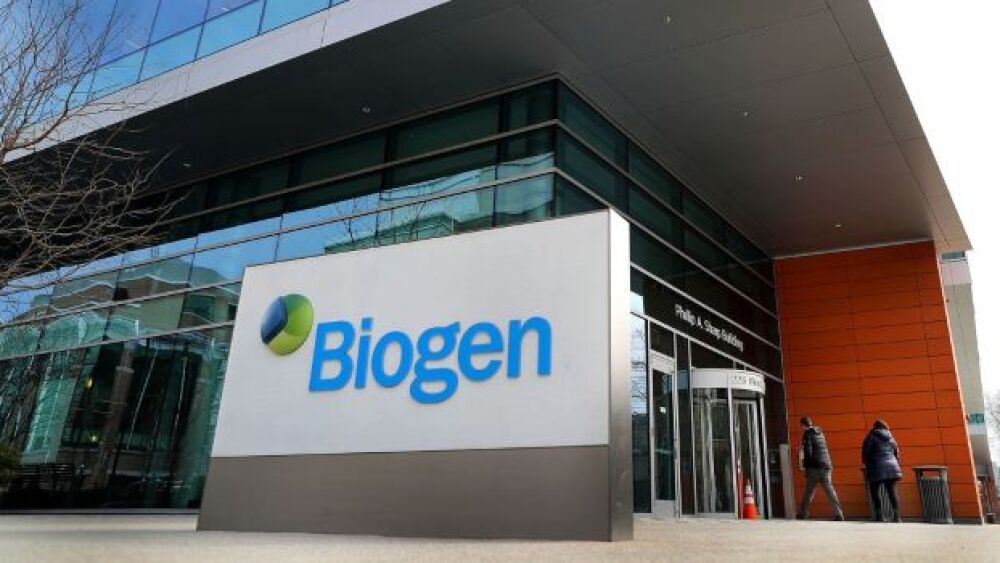Three members of the FDA’s Peripheral and Central Nervous System Drugs Advisory Committee published their objections to the drug in a JAMA article.
John Tlumacki/The Boston Globe via Getty Images
Biogen’s aducanumab for Alzheimer’s disease, which has a target action date with the U.S. Food and Drug Administration (FDA) of June 7, took another hit, this time a follow-up from members of the FDA advisory board who slammed it in November 2020.
Three members of the FDA’s Peripheral and Central Nervous System Drugs Advisory Committee, Caleb Alexander, Scott Emerson, and Aaron Kesselheim, published their objections to the drug in a JAMA article.
The background on this drug has been long and convoluted. Aducanumab is a high-affinity, fully human IgG1 monoclonal antibody that targets a conformational epitope found on beta-amyloid. In March 2019, Biogen and Tokyo-based Eisai announced they were discontinuing the global Phase III clinical trials, ENGAGE and EMERGE, of aducanumab in patients with mild cognitive impairment for Alzheimer’s and mild Alzheimer’s dementia. They were also discontinuing the EVOLVE Phase II trial and the long-term extension PRIME Phase Ib trial. An independent data monitoring committee indicated they were unlikely to hit their primary endpoint.
But in October 2019, the two companies announced plans to pursue regulatory approval for the drug. It turned out, the Phase III EMERGE trial met its primary endpoint, showing a significant decrease in clinical decline. Biogen presented the findings in the final data analysis in a December 2019 conference, and although there was still some skepticism about the overall data, it did appear to be enough to file for a BLA and the company planned to do so in the second quarter of 2020.
What they presented was that the Phase III EMERGE trial met its primary endpoint, showing a significant decrease in clinical decline. Biogen said the data from a subset of patients that received a high enough dose of the drug had significant benefits on measures of cognition and function, including memory, orientation, and language, as well as benefits on activities of daily living.
Although many had issues with some of the data, which was very complex, the companies felt they had a strong enough case to submit it to the FDA and were expected to do so in spring 2020.
Then, in April 2020, they announced that although the company had begun to submit parts of the BLA, they did not expect to complete it until the third quarter of 2020.
The submission was completed in August 2020 with ongoing collaboration with the FDA and include data from the Phase III EMERGE and ENGAGE trials, as well as the Phase Ib PRIME study. Biogen has also requested Priority Review.
In November 2020, the FDA’s Peripheral and Central Nervous System Drugs Advisory Committee slammed the drug submission, voting 1 yes, 8 no and 2 uncertain on the question, “Does Study 302 (EMERGE), viewed independently and without regard for Study 301 (ENGAGE), provide strong evidence that supports the effectiveness of aducanumab for the treatment of Alzheimer’s disease?” It also voted 0 yes, 7 no and 4 uncertain on whether Study 103 (PRIME) supported the effectiveness of the drug. Again and again, the committee voted against the drug.
In their article in JAMA, they go over the data for and against the drug, but also question physicians’ ability to monitor the drug’s negative side effects effectively. They note that with a huge and growing unmet need Biogen’s development of the drug “deserves recognition for a development program that included the design and conduct of two well-controlled, randomized, potentially pivotal trials that should be published in the peer-reviewed literature.”
Then they go on to say, “However, considering that these efficacy trials were stopped for futility, there is no reason to favor the trial with the positive signal in one of two treatment groups over the trial with the negative outcome in both treatment groups, and there is no persuasive evidence to support approval of aducanumab at this time. Randomized trials should remain the primary means that regulators use to assess product efficacy, and that patients, physicians and policy makers rely on, to have confidence in the safety and effectiveness of new therapeutics.”
This is a much more technical way of saying what Emerson said at the FDA advisory committee meeting in November: “Analysis seems to be subject to the Texas sharpshooter fallacy, a name for the joke of someone first firing a shotgun at a barn and then painting a target around the bullet holes.”
The article stated that the sponsor companies “inadvertently select(ed) data precisely because those data were consistent with the outcomes that were hoped for.”
In addition, the three scientists, who work at Johns Hopkins Bloomberg School of Public Health, the University of Washington and Harvard Medical School, criticized the way the FDA and Biogen worked together on the available data prior to the submission: “This undertaking reflected an unusual degree of collaboration between the FDA and manufacturer of aducanumab, and the arrangement has been criticized as having potentially compromised the FDA’s objectivity.”





